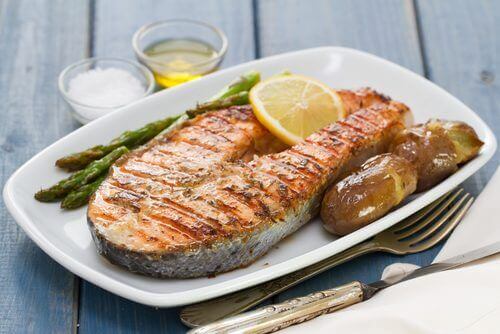Low-Calorie Mediterranean Diet: What Should You Keep in Mind?


Written and verified by the nutritionist Anna Vilarrasa
The Mediterranean diet is truly a treasure for our health, and following a low-calorie Mediterranean diet has proven benefits. In this article, you’ll discover what to keep in mind to make it healthy, effective, and enjoyable. Get ready to take notes!
The Mediterranean diet, a source of health
The Mediterranean diet has numerous benefits for our health. The majority of them are associated with the prevention of chronic diseases: obesity, type 2 diabetes, cardiovascular diseases, elevated triglycerides and cholesterol levels, and others.
For decades, the Mediterranean diet has been the focus of a large number of scientific studies. The PREDIMED study (Prevención con Dieta Mediterránea) is one of the most notable. It studied the effects of this nutritional pattern in a total of 7,400 patients over a period of 5 years.
Read more: Ten Basic Aspects for Starting a Mediterranean Diet
PREDIMED-plus, a low-calorie Mediterranean diet
“Following a hypocaloric Mediterranean diet and practicing daily physical activity helps patients lose weight, lower cardiovascular risks, and maintain these benefits at the end of one year for patients who suffer from metabolic syndrome, obesity, and who are overweight.”
This is the PREDIMED-plus study’s main conclusion. It also found that patients who follow this dietary regimen showed “improvements in the control parameters of glucose metabolism, their lipid profile, and some markers of inflammation when compared to those who didn’t follow the diet.”
These are encouraging results when facing the increasing rates of obesity and being overweight that have been reported in Spain in recent decades. Adherence to the diet (being able to follow it over a long period) is a key point for maintaining the benefits long-term and truly improving health.
Now that you’re familiar with the benefits of the Mediterranean diet and how a low-calorie diet can be beneficial to health, let’s see how to put it into practice.
The 5 key points of the low-calorie Mediterranean diet
Cutting calories can’t come at the expense of the quality of our diet, or the equilibrium of macronutrients. Furthermore, it’s important to keep the basic principles of the Mediterranean diet intact so you don’t lose its beneficial effects.
To avoid making mistakes that might harm your health, you should follow these 5 basic tips. That way, your low-calorie Mediterranean diet will be a total success.
1. Fruits and vegetables, main players of our meals

Fruits and vegetables are a great source of antioxidants, fiber, and useful vitamins. These nutrients can help to prevent cardiovascular diseases and other health problems.
In a low-calorie Mediterranean diet, vegetables should be the foundation of our nutrition. They should represent about half of what we eat.
A tip to stay on track: Eat a nice salad or some grilled vegetables as a first course. They’re light, and help to keep you hydrated. Additionally, if chewed well they have a satiating (filling) effect thanks to the fiber they provide.
There are many garden items you can use to make salads and a variety of dishes. Some options are:
- Tomatoes
- Lettuces
- Carrots
- Peppers
- Onions
- Mushrooms
- Cucumbers
- Spinach
- Escarole
- Radishes
- Celery
- Gourds
- Zucchini
- Eggplant
You just have to pay attention to extra ingredients, because if you add too much cheese, tuna, corn, olives, or pasta, then the dish won’t be hypocaloric.
Read more: Five Recipes for Low-Calorie Salad Dressing
2. Nutritious breakfasts
To follow a low-calorie Mediterranean diet, it’s not necessary to skip any meals. For breakfast, you could choose toasted whole-grain bread with tomato and olive oil, with some ham, tuna, or a slice of cheese.
Another healthy option is a bowl of natural yogurt or kefir with fresh fruit slices and a handful of dried fruits.
In any case, try to avoid white bread, breakfast cereals, cookies, or cocoa. They usually contain large amounts of sugar, and you’ll probably get hungry again soon after.
3. Eggs, legumes, and fish: sources of protein

To accompany fruits and vegetables, it’s best to choose quality sources of protein. Blue or white fish and eggs are low-calorie foods that can be prepared in healthy ways. In addition, foods rich in protein have a satiating effect that makes us feel full longer.
Fish can be cooked in the oven, skillet, or steamed. You can season with fresh herbs and spices for added flavor. Eggs can be cooked by themselves, or into an omelet.
Legumes also provide quality protein, in addition to fiber and minerals. Furthermore, they have always formed part of the Mediterranean diet. However, they’re being consumed less frequently. That’s why it’s important to incorporate them, since they’re so beneficial to our health.
You can add them to your salads two or three days a week, and you’ll have a dish that’s nutritionally complete.
4. Fats, always present in our diet
Fats are one of the nutrients that provide us with the most energy. But they’re also a necessary nutrient for the correct functioning of our bodies.
That’s why it’s not advisable to eliminate fats from the diet, even if it’s a low-calorie diet. It’s important to choose them wisely and not go overboard.
Extra virgin olive oil (EVOO) is one of the healthiest fats around. So, this will be our choice for cooking and dressing our plates daily. You can make delicious homemade vinaigrettes with lemon or orange juice, vinegar, and fresh herbs.
Dried fruits and nuts also provide us with healthy monounsaturated fats. Additionally, they have a satiating effect and are a good source of fiber, ideal for regulating our intestinal function. Just a handful a day for breakfast or a snack is enough. It’s best if they are raw or toasted, nothing fried or salted.
5. Light and healthy foods between meals

If you’re one of those people who needs to eat a mid-morning or late afternoon snack, or you know you’ll be going a long time without eating, you need to plan ahead. Otherwise, you can succumb to the temptation to eat the first thing in sight, which most often isn’t a very good choice.
Planning ahead and preparing something light is the best idea for sticking to the low-calorie Mediterranean diet. Some fresh fruit, a handful of dried fruit, a natural yogurt, or some vegetable sticks with hummus are the best possible choices.
We hope we’ve made that all clear. So, now you can get to work and truly take care of yourself with the Mediterranean diet. Of course, we suggest you accompany it with physical activity and a healthy lifestyle.
All cited sources were thoroughly reviewed by our team to ensure their quality, reliability, currency, and validity. The bibliography of this article was considered reliable and of academic or scientific accuracy.
- Álvarez Álvarez, I. et al. Dieta mediterránea hipocalórica y factores de riesgo cardiovascular: análisis transversal de PREDIMED-Plus. Revista Española de Cardiología. Mayo 2018. DOI: 10.1016/j.recesp.2018.08.007
- Estruch, R et al. Primary prevention of cardiovascular disease with a mediterranean diet supplemented with extra-virgin olive oil or nuts. The New England Journal of Medicine. June 2018.DOI: 10.1056/NEJMoa1800389
- Salas-Salvadó, J et al. Effect of a lifestyle intervention program with energy-restricted Mediterranean diet and exercise on weight loss and cardiovascular risk factors: One-year results of the PREDIMED-Plus trial. Diabetes Care. November 2018. dc 180836.
- Schulze, M.B, et al. Food based dietary patterns and chronic disease prevention. British Medicine Journal . June 2018. 13;361:k2396.
This text is provided for informational purposes only and does not replace consultation with a professional. If in doubt, consult your specialist.








